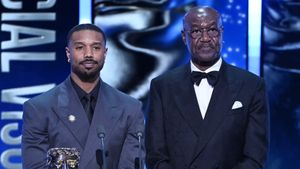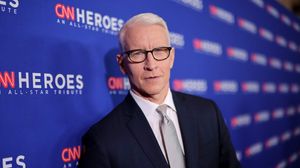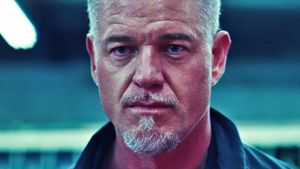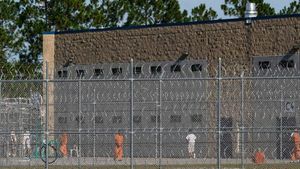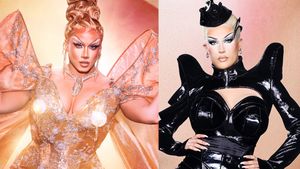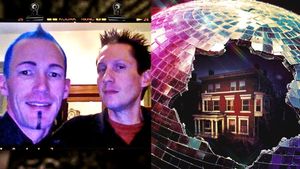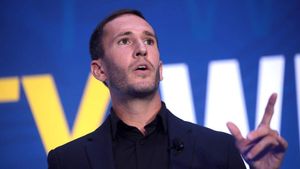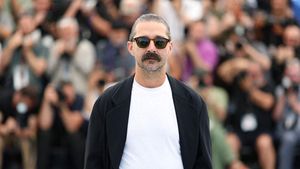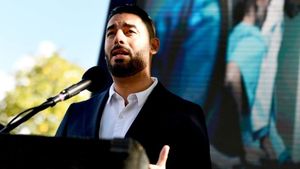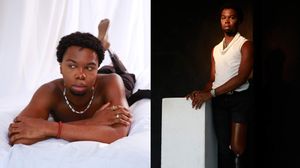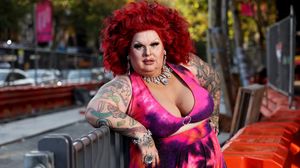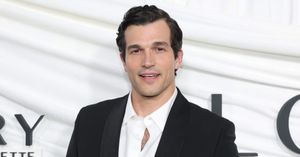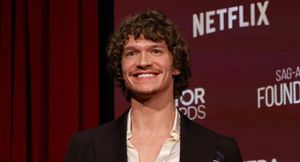 During his early days of dealing with his HIV-positive diagnosis over 20 years ago, actor Mel England woke up every morning to a white piece of notebook paper taped above his bed with a simple Deepak Chopra quote: “I’m an infinite field of potentiality.”
During his early days of dealing with his HIV-positive diagnosis over 20 years ago, actor Mel England woke up every morning to a white piece of notebook paper taped above his bed with a simple Deepak Chopra quote: “I’m an infinite field of potentiality.”
“I would bicycle up the side of that mountain in Boulder chanting, ‘I’m gonna live, I’m gonna live, I’m gonna live,’ ” he says. England’s life with HIV has been a turbulent one.
Diagnosed in the late 1980s, the actor lived through the loss of friends and stigma of being positive.
“As a friend of mine puts it, it was like living in wartime,” recalls England. “We were surrounded by death.”
He was only 19 years old when he was diagnosed. At the time, England was beginning his life as an actor, attending New York University on a full-ride scholarship and working with Marlon Brando’s acting teacher. It had seemed like a dream come true for the Texas native, whose parents recognized his “demonstrative” traits and enrolled him in acting lessons at the Dallas Theater Center at age 5. He grew up in the theater, began working in professional theater in sixth grade, and attended a performing arts high school.
But after his diagnosis, England was a bit lost. He felt his dreams of becoming a working actor were dead, and the message he got from everyone — the government, the doctors, his family, the media — was that he was going to die.
He ditched the big-city life for health-crazed Boulder, Colo., on a recommendation from his friend. Forgoing AZT, the only anti-HIV medication available at the time, England focused instead on alternative treatments like homeopathy and nutrition, and coped through using alcohol and marijuana.
“I know I had made a decision to live then, I just didn’t know how to, and I was trying everything I could,” England says of his time in Boulder.
 It wasn’t until he had progressed to AIDS that England had an epiphany about how to go about living. He had been suspicious of government recommendations to take AZT, because, as he put it, he “had no reason to believe these people had my best interest at heart.” But lying in a hospital bed with his mother by his side, England looked around and realized everyone there, including his mother and the doctors and nurses, was trying to help him get better.
It wasn’t until he had progressed to AIDS that England had an epiphany about how to go about living. He had been suspicious of government recommendations to take AZT, because, as he put it, he “had no reason to believe these people had my best interest at heart.” But lying in a hospital bed with his mother by his side, England looked around and realized everyone there, including his mother and the doctors and nurses, was trying to help him get better.
“I had to realize in my head these people are trying to help me, these people are trying to save my life,” the actor recalls. He agreed to go on treatment, got sober, and moved back to New York City.
The antiretroviral treatment made England confront the seriousness of HIV but also gave him a way to live life he didn’t have before. After years of stage acting, England moved to Los Angeles a decade ago to launch his film career.
Also, in 2009 he channeled his experience as a survivor into his critically acclaimed one-man, off-Broadway show, Swimming With the Polar Bears, as part of a benefit for the nonprofit organization the Climate Project. He took the solo show on a worldwide tour, with stops in Washington, D.C., for Earth Day and at the United Nations’ Climate Change Summit in Copenhagen. (The posters for the show were signed by his best-known supporter, Al Gore.)
Today, the 40-something actor is making a name for himself on the indie film circuit. His film Ron and Laura Take Back America has garnered awards at several festivals (including Best Comedy at the New York City International Film Festival).
Written and directed by England and actress Janice Markham, the film is a mockumentary satire about American politics, religion, Hollywood, gays, health-food nuts, and reality TV, and it features actors Irene Bedard and Jim J. Bullock as well as a cameo by the legendary Sally Kirkland.
England has already starred in a string of indie hits — Little Big Top, Highlights, Archeology of a Woman, and Persona Au Gratin (which won Best Comedy at Indie Fest USA) — and has appeared on a few TV series, notably the crime shows Murder and Unusual Suspects.
His latest film, Best Day Ever, won the prize as Best LGBT Feature Film at Indie Fest 2014. In that buzzworthy film, England plays a 50-year-old gay filmmaker going through a midlife crisis in Hollywood who unexpectedly finds love with a much younger man from Iowa. The irony of a healthy, HIV-positive man now playing a middle-aged character is not lost on England. A survivor of both AIDS and cancer, England was able to relate to the crisis of his character, though he jokes that like a lot of gay men of his generation who witnessed the AIDS epidemic firsthand, he went through his midlife crisis in his 20s rather than his 40s. Now England can reflect on his life and the massive changes he’s seen in such a short time.
“I’m so excited for the kids these days,” he says about the change in acceptance of LGBT people. “We were so used to living trauma from AIDS. We were so used to living in the closet. It was like living in a prison — and we had to decorate it, make it look pretty.”
He laughs. “Leave it to a gay man to talk about decorating, but whatever.”
However, England says there’s still more work that needs to be done to destigmatize being HIV-positive. He hopes that by being open about his status and living a life without shame, he can show that it shouldn’t matter so much.
 “Why would I be ashamed of this? It’s my biggest accomplishment,” he says. “It’s just not a big deal. I don’t think it should be a big deal.”
“Why would I be ashamed of this? It’s my biggest accomplishment,” he says. “It’s just not a big deal. I don’t think it should be a big deal.”
He notes that HIV treatment has come so far since the early AIDS crisis that HIV today is not much different from other chronic illnesses.
“It’s like diabetes now,” he says with a slight chuckle at his own hyperbole. “So why are we treating it like the bubonic plague?”
England gets serious reflecting on his younger self, and there is a long pause. What would he tell his younger self?
“Oh, wow,” he says, “Beyond anything, I’d tell myself, don’t be afraid, that it’s OK to hope and it’s OK to dream.”
There is a second long pause. England explains that he’d grown up in a time and place where it wasn’t OK to be gay. “It’s like you weren’t allowed to breathe, much less have an erection.”
It has been quite a journey for England from his home in Texas to his diagnosis in New York to his years in Colorado and finally back to life as an actor in Hollywood. It’s this journey that has made him what he is today, he says. Would he change any of it?
“Would I wish I didn’t have HIV? I don’t know — it would be like saying, ‘Would I wish I wasn’t me?’ ” he says. “It’s such a part of my life.”
Styling by Anton Khachaturian (AntonKMakeup.com) using MAC Cosmetics and Kevin Murphy Hair Care. Suit by Calvin Klein. Location: Studio M Productions in Culver City, Calif.
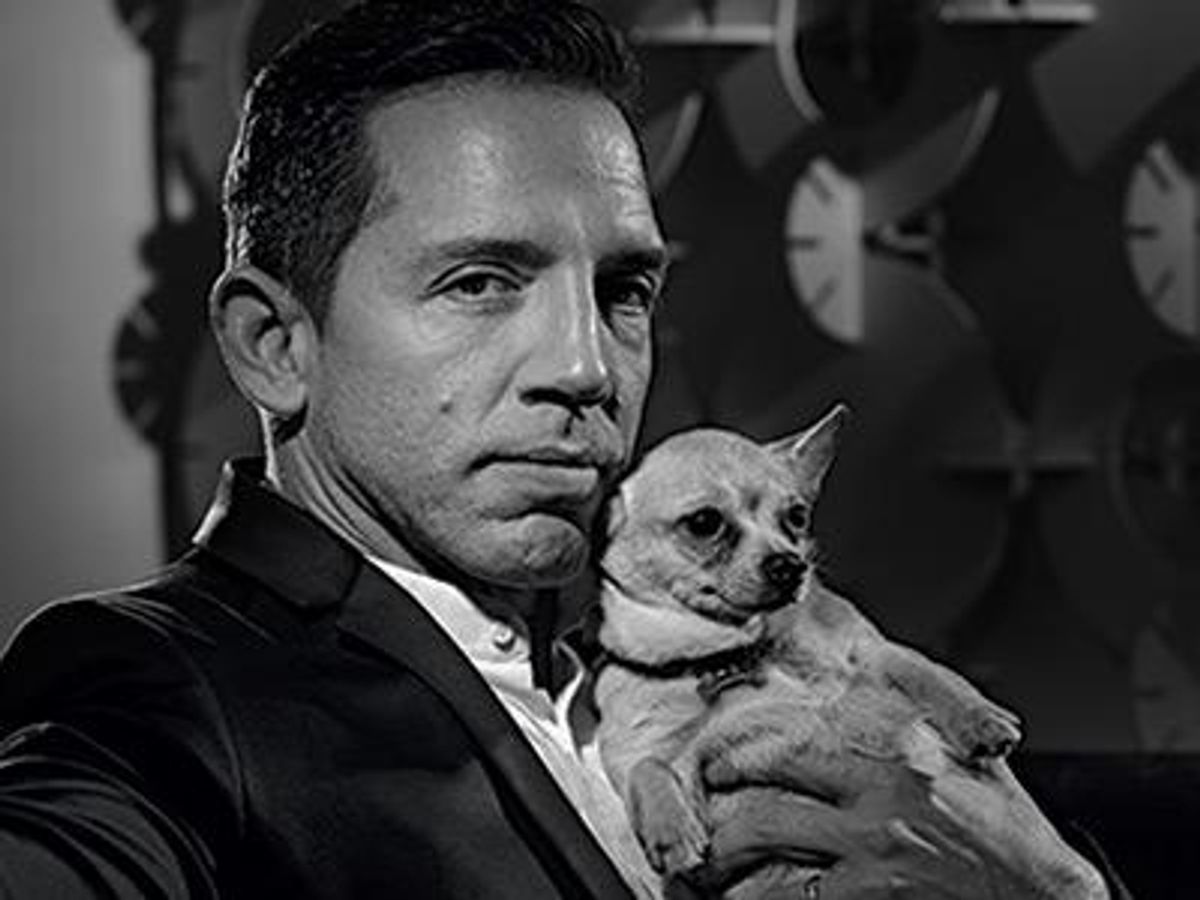
 During his early days of dealing with his HIV-positive diagnosis over 20 years ago, actor Mel England woke up every morning to a white piece of notebook paper taped above his bed with a simple Deepak Chopra quote: “I’m an infinite field of potentiality.”
During his early days of dealing with his HIV-positive diagnosis over 20 years ago, actor Mel England woke up every morning to a white piece of notebook paper taped above his bed with a simple Deepak Chopra quote: “I’m an infinite field of potentiality.” It wasn’t until he had progressed to AIDS that England had an epiphany about how to go about living. He had been suspicious of government recommendations to take AZT, because, as he put it, he “had no reason to believe these people had my best interest at heart.” But lying in a hospital bed with his mother by his side, England looked around and realized everyone there, including his mother and the doctors and nurses, was trying to help him get better.
It wasn’t until he had progressed to AIDS that England had an epiphany about how to go about living. He had been suspicious of government recommendations to take AZT, because, as he put it, he “had no reason to believe these people had my best interest at heart.” But lying in a hospital bed with his mother by his side, England looked around and realized everyone there, including his mother and the doctors and nurses, was trying to help him get better.  “Why would I be ashamed of this? It’s my biggest accomplishment,” he says. “It’s just not a big deal. I don’t think it should be a big deal.”
“Why would I be ashamed of this? It’s my biggest accomplishment,” he says. “It’s just not a big deal. I don’t think it should be a big deal.”

























